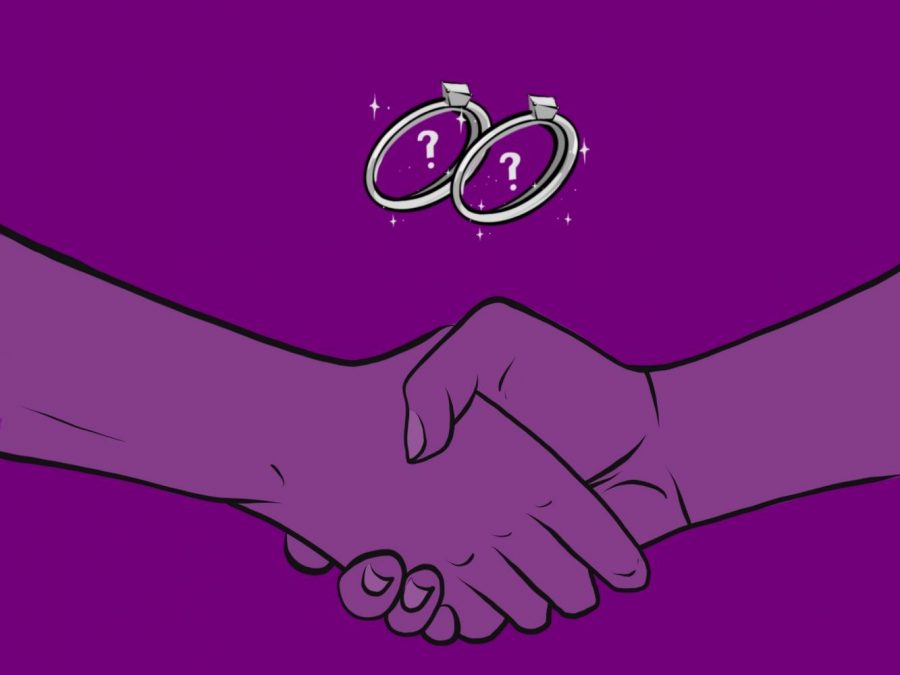In a pandemic that has perpetuated isolation, genuine lasting connections are few and far between. This happens to coincide with the technological revolution of dating apps, like Tinder and Bumble, which exist to spark interaction. However, if you’ve ever tried these apps you know those connections are often neither genuine nor lasting.
Meet the NYU Marriage Pact: a group of NYU students on a mission to change the way we navigate the online dating world within the university.
The Marriage Pact had students take a questionnaire that touched on a variety of topics such as their political values, inclinations towards revenge and even how smart they think they are. From there, a computer-generated algorithm took these answers and matched them to students based on compatibility. According to the email from NYU Marriage Pact ([email protected]), the algorithm took everything into account when determining your “maybe-soulmate.”
The students launched the Marriage Pact in an email in late January of this year. To gather enough student responses, users had two weeks to take the survey before their results came back just in time for Valentine’s Day.
The Marriage Pact gained traction with the student body through Instagram posts as well as numerous emails students exchanged among each other. Additionally, anyone who filled out the Marriage Pact could anonymously forward it to others under the guise of a “secret admirer.”
Tisch sophomore Isabella Garcia first learned about the questionnaire through email. She couldn’t believe that a group of NYU students from different schools would be capable of finding her a perfect match.
“I heard about it in an email and then my friends started posting about it on Instagram because we’re all lonely and desperate during this pandemic,” Garcia said.
NYU Shanghai sophomore Tony Kinninger found out about the Marriage Pact through their growing social media presence. Like Garcia, Kinninger was hesitant to participate.
“It sounded pretty interesting because I’ve tried many other dating apps, and I lost a lot of interest in them,” Kinninger said. “I was a little bit sketched out at first, like undecided, but then I tried it because, I don’t know, I think it was a one-time opportunity and who knows what would happen.”
Already in a relationship, Tisch sophomore Megan Wachtel answered the questions and opted for the Marriage Pact’s platonic option
“The concept of it was really cool to me,” Watchtel said. “I was just really looking for a really good match platonically.
Though all three students filled out the questionnaire, none of them found their “maybe-soulmates,” platonic or otherwise. Kinniger never reached out to his match, and Wachtel only messaged hers through Instagram. Garcia actually met up with hers.
“It was a success because I met a nice person that might become a lifelong friend,” Garcia said. “But it was a failure in the sense that it felt like you can’t have an algorithm to like pair people together romantically, I don’t know where they were going with that, but I think that set up an expectation that completely wasn’t really realistic.”
For Kinninger, the algorithm couldn’t find anyone whose answers strongly matched his.
“I think it was a failure in my specific case,” Kinninger said. “My percentile with her was like 58%, which was really weak so because of that part, I wasn’t really that excited.”
Although the questions are designed to guide users in finding a true connection, Wachtel explained that it’s hard for her to connect solely through deep, fundamental beliefs. Instead, she wished that the questions focused more on lighter subjects, like hobbies and interests. She believes that those questions would have established a more comfortable common ground with the approximate 7,400 people who participated.
“A lot of the questions were kind of like moral compass type questions,” Wachtel said. “When I ended up getting my match, we had really different interests.”
Even though none of the interviewees’ matches were made in heaven, they expressed happiness that they participated in the process.
“I guess on the good side the NYU Marriage Pact tries to bring people together from their own community, and they did it in, I think, in a good way,” Kinninger said.
Kinninger went on to say that he knows people who did talk and meet up with their match, but unfortunately it didn’t work out for him.
“I thought it was really cool because it made me think about myself, my values and how I differ from other people,” Wachtel said.
The NYU Marriage Pact is now closed, so you’ll have to wait until next year to find your campus soulmate.
Email Sarah Gil at [email protected].


























































































































































